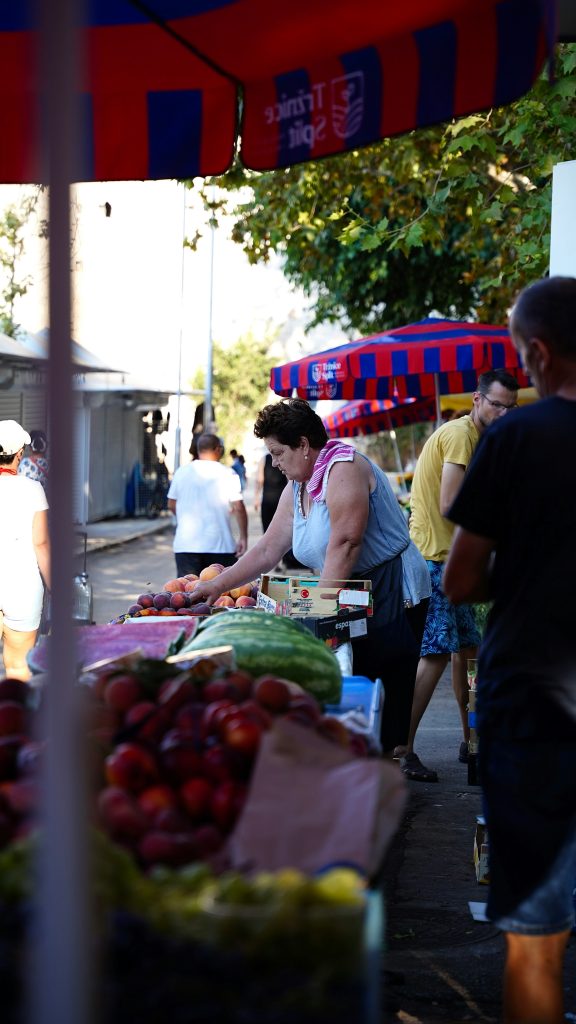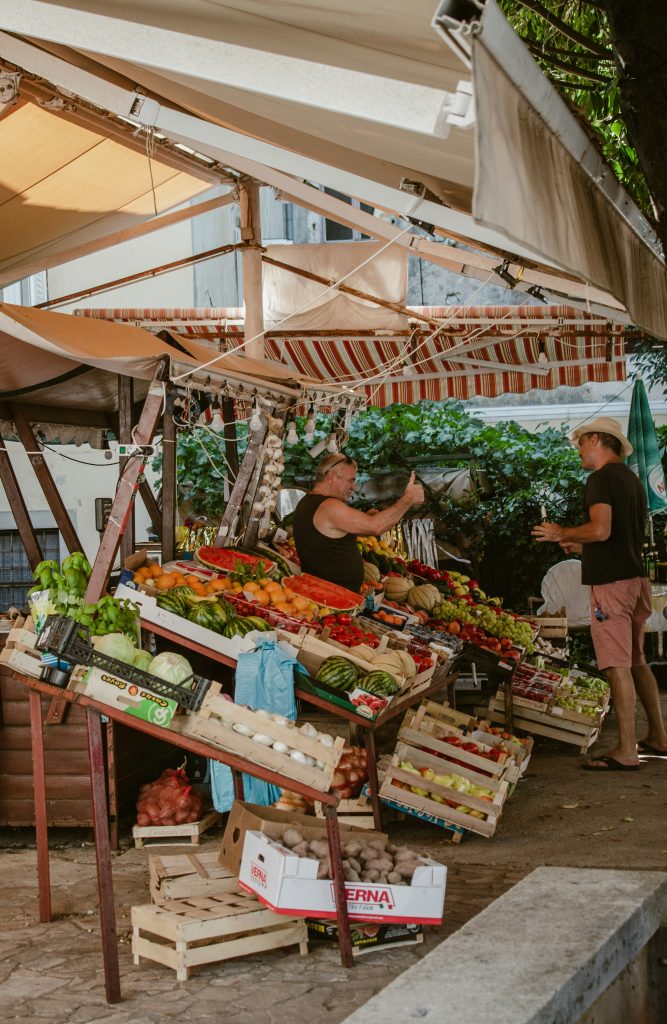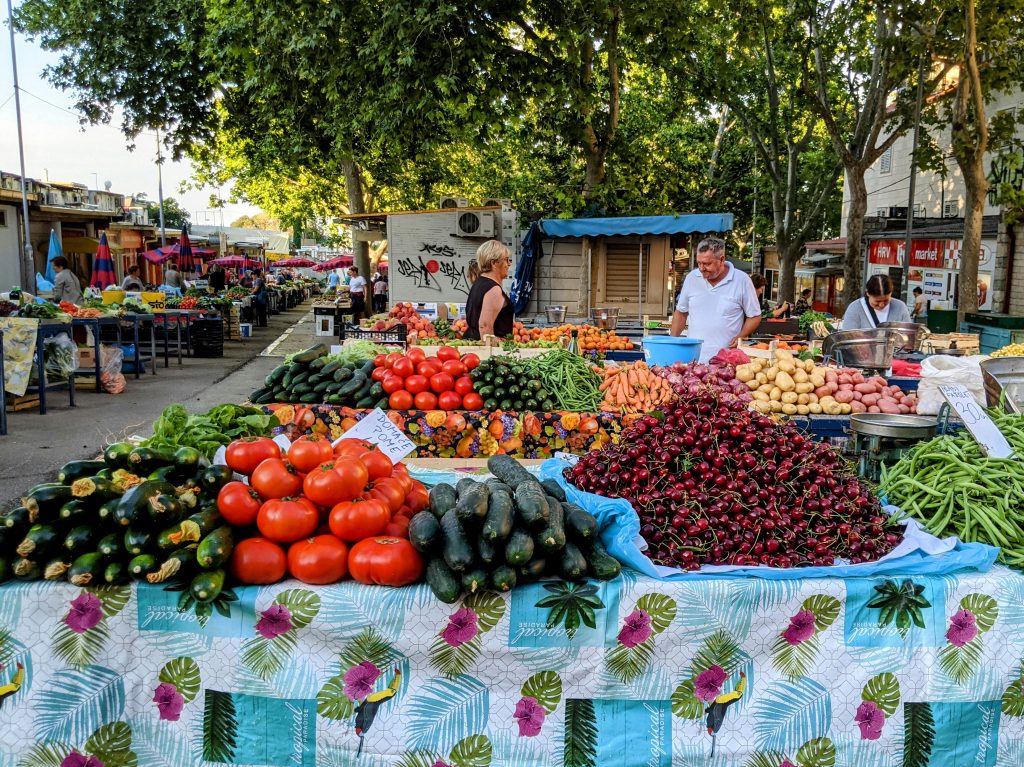August the 10th, 2024 – The Croatian agriculture sector has a battle on its hands. Firstly against rising prices, even for domestic produce, and secondly against increasing fruit and vegetable imports.
As Poslovni Dnevnik/Miroslav Kuskunovic writes, as has unfortunately become the rule every summer, the Croatian agriculture sector has a fight on its hands. Croatian fruit and vegetable producers are complaining that they have no one to sell their goods to, adding that they have to throw them away or simply give them out because they can’t cover their costs with their purchase price. At the same time, imported cheap fruit and vegetables from elsewhere across the European Union and the region are flooding the market. The most recent example of all of the above are Virovitica farmers lamenting that there is nobody to sell homegrown peppers and cucumbers to.
For some vegetable growers from the Virovitica area, in the middle of July, smack bang in the middle of the tourist season, buyers stopped buying peppers and cucumbers. Therefore, they decided to plough tonnes of these vegetables into the ground, or simply destroy them. Many in the Croatian agriculture sector are currently complaining that they cannot conclude any secure contracts with buyers in a situation where Croatia imports 270 million euros worth of vegetables annually. What is actually happening on the domestic fruit and vegetable market?
bargaining power

Although the formula is very simple, producers operating within the Croatian agriculture sector haven’t wanted to put it into practice for years. Alone, with small quantities and without a buyer known in advance, at the moment when their production matures, they will naturally not have anyone to sell their fruits and vegetables to. With that being as it is, if they want to be competitive, they’ll have to come together in cooperatives, or as they’re now called in the EU, producer organisations. Only united will the Croatian agriculture sector actually have stronger negotiating power and be able to deal with import issues.
It isn’t the same if only one producer comes to offer their production to a trade chain or buyer, even if there are ten or fifty of them. The costs of acquiring seeds, fertilisers, and machinery are not the same either.
It’s also not the same if a farmer only produces and delivers their fruit and vegetables to, say, a cooperative. In such cases, some professional manager then sells them on, but when they have to plant, harvest, look for a buyer, keep their books, fight with the market, etc, they’re surely doomed in advance. That’s why all fruit and vegetable production in Croatia is collapsing, as the statistics clearly confirm.
Of course, we can’t even give amnesty to the state (which admittedly does give huge incentives to the Croatian agriculture sector) for this problem. The state doesn’t control imports, nor does it allow for huge amounts of fruit and vegetables to enter the market from all over the EU and the countries of the region. We’re talking about huge surpluses here which come at much lower prices than the prices in Croatia. As a result, retailers will put them on their shelves instead of the more expensive domestic fruits and vegetables, because purchasing power determines what will be offered.
This is how merchants increase their profits (on the high prices of bad goods), and customers buy what is offered to them more cheaply. That’s why in Croatia, there’s an extremely poor offer of fruits and vegetables on the shelves. What’s there is also of extremely poor quality (almost every ordinary consumer claims this), and the prices are not low, in fact they’re only getting higher. This vicious circle could and should be broken by the state.
It should strongly encourage producers in the Croatian agriculture sector to join forces and help them in this process. On the other hand, it should control the quality of what’s on the market, but also monitor price dumping and severely punish traders and importers engaging in it. It should engage in this at the very least at the moment when the offer of domestic goods is large.
The Croatian Chamber of Agriculture (HPK) itself is outraged that such situations continue to occur on the Croatian market. It is frustrated that when domestic production enters the market, retail chains and import lobbies import fruits and vegetables from the global market. These goods are usually of inferior quality and are sold at prices that are below the manufacturer’s.
“Unfortunately, we didn’t succeed in this, but we’re still trying to convince the authorities that it is time to put an end to these practices, because in this way we’re losing more and more producers and production. We’re witnessing consumers being outraged that fruit and vegetables of the lowest category are being offered and sold in retail chains. That’s very clearly evident on numerous consumer portals and social media where people post comments and photos of imported fruit and vegetables that certainly would never be placed on on the shelves of retail chains in numerous other EU countries”, stated HPK president Mladen Jakopović.
price tracking in the croatian agriculture sector

For many years, HPK has been trying to prompt the state to change these situations. It’s already fairly well known that it has repeatedly requested the establishment of a proper commission to monitor producer prices and those from imports. This would be in order to determine what is being sold below the producer price on domestic market.
He added that, unfortunately, inspections still deal with potential health issues, but not with the quality of imported goods, which is also a huge problem. The Croatian Chamber of Agriculture says that they have to be completely honest and say that they’re increasingly receiving complaints from consumers that the products being sold by domestic producers, especially at the markets, are also too expensive. Considering the general purchasing power of the general public, it’s not a shock that they then opt for more affordable imported fruits and vegetables. They have no particular loyalty or emotion for Croatian producers when the prices are as ridiculous as they currently are. And that’s understandable.
a complex and unresolved yearly issue

This problem, which is a hot topic every summer, is very complex and something additional needs to be done to promote domestic production. There also needs to be much more encouragement for producers in the Croatian agriculture sector to join forces. What may be seen as a possible positive step is, for example, Podravka becoming the owner of the agricultural business of the massive Fortenova Group.
Over more recent years, Podravka has been the leader in starting cooperation. Croatian farmers therefore believe that with this takeover of Podravka, they’ll manage to stimulate new processes and that this could be a turning point for the Croatian agriculture sector to produce for a well-known customer at pre-agreed purchase prices. HPK expects that Podravka will now strengthen cooperation across all aspects of domestic production, and this could then stimulate other companies in a chain and perhaps reverse the current very concerning trends.
A spontaneous appearance on the market, with small quantities and high prices, is not the way to go because the state doesn’t have the mechanisms to ban imports, especially from the EU. Croatian producers need better organisation and association as the only way to strengthen themselves on the market. Unfortunately, the import of food, especially fruit, vegetables, meat, milk and bakery products, continues to increase, and this is what should concern Croatia as a society and as a country.
Last year, the historically largest foreign trade deficit in the exchange of agricultural and food products was recorded. Unfortunately, in the first quarter of this year, we’ve also witnessed the continuation of negative trends – exports stagnated, while imports grew by 9%. Since joining the EU until today, the physical volume of domestic production has fallen by 5%. The fact that subsidies in the Croatian agriculture sector have tripled during that period is particularly worrying.











